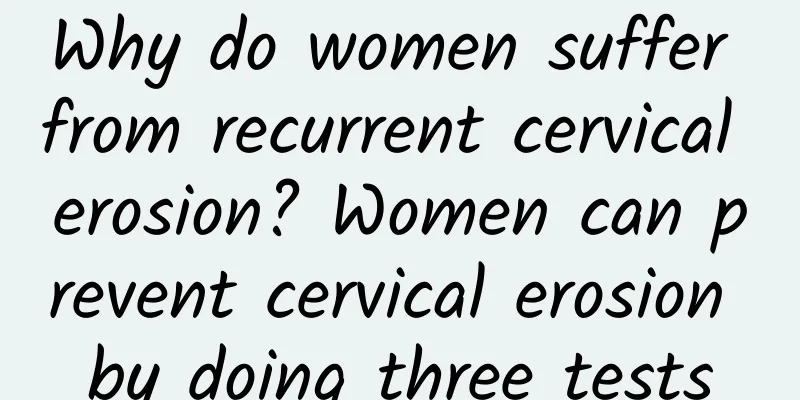Why do women suffer from recurrent cervical erosion? Women can prevent cervical erosion by doing three tests

|
Cervical erosion causes trouble to many women, not only because of its high incidence, but more importantly, the disease often recurs and is difficult to cure. So, what are the causes of recurrent cervical erosion? How to prevent recurrent cervical erosion? What are the causes of recurrent cervical erosion? 1. Age factor Generally speaking, the recurrence rate after the first treatment is lower for female patients under 30 years old, while the recurrence rate is higher for female patients over 30 years old. This is related to factors such as the patient's age and her own resistance. 2. Lesion severity The larger the area of cervical erosion, the higher the possibility of recurrence after treatment. Under normal circumstances, patients with mild and moderate cervical erosion have a high cure rate and rarely relapse; while patients with severe cervical erosion have a relatively low cure rate and a high recurrence rate. 3. The first treatment is not thorough The reason why many women suffer from recurrent cervical erosion is related to incomplete initial treatment. For example, during physical treatments such as laser, electric perm or microwave, the treatment range is too superficial or too limited, which will lead to the erosion area not being completely destroyed, resulting in residual diseased tissue, which is likely to cause recurrent disease. 4. Repeated abortion Repeated artificial abortion is also a common cause of recurrence of cervical erosion after treatment. If the number of abortions is too many, the female cervix will be repeatedly damaged and lead to the occurrence of erosion. How to prevent recurrence of cervical erosion 1. Do not abuse antibiotics Some women lack basic medical knowledge and think that using more antibiotics to treat cervical erosion can relieve symptoms. However, although antibiotics can effectively kill bacteria, they can also inhibit some beneficial bacteria, so pathogens will take this opportunity to multiply and even aggravate the condition. 2. Do not over-clean the vagina Excessive use of vaginal washes, failure to use sterilized pads, etc., can easily destroy the bacterial flora in the vagina. Once the microenvironment in the vagina is destroyed, the defense function will be reduced, and bacteria can easily take advantage of the opportunity to enter, causing more discomfort. 3. Wash your underwear separately To prevent bacteria from attaching to underwear, women with cervical erosion should wash their underwear separately, and it is best to soak and wash them with a special sterilizing solution. Since tight synthetic underwear can increase the humidity and heat in the vagina, causing bacteria to grow in large numbers, it is best to choose cotton underwear. 4. Be wary of washing machines Almost every washing machine has pathogens hidden in it, and the more frequently you use the washing machine, the more pathogens there are. Therefore, you should clean the washing machine regularly, clean the washing machine with hot water at about 60℃, and clean it with clothing disinfectant regularly to avoid the spread and transmission of bacteria. Early screening is necessary to prevent recurrence of cervical erosion 1. Routine gynecological examination Routine gynecological examinations mainly include two aspects: routine leucorrhea testing. If the patient has vaginitis, it should be determined what kind of pathogen is the cause of the infection; cervical examination, such as understanding the size, shape, texture of the cervix and the thickness of the cervical canal, and performing cervical smear cytology examination, which is to apply 3%-5% acetic acid solution on the cervical smear. The reaction of the cervical epithelium to acetic acid and the biopsy results of the white lesion area can not only assist in the diagnosis of cervical erosion, but also effectively screen for cervical cancer. 2. Colposcopy Colposcopy mainly involves magnifying the cervix 20 to 40 times, visually understanding the condition of the cervix with the naked eye, and observing the changes in the cervical epithelium with the assistance of iodine and vinegar to assist in the diagnosis of cervical erosion. It also examines the condition of the vulva, vagina, and uterus, determines the severity of cervical erosion, and understands whether the lesions involve the fallopian tubes and pelvic cavity. 3. TCT examination The so-called TCT test, namely liquid-based thin-layer cell test, is mainly used to exclude cervical erosion cancer. It analyzes cervical secretions at the cellular level to understand whether there is a possibility of suspected malignant lesions. The detection rate of cervical cancer cells can be as high as nearly 100%, and it is more sensitive to microbial infections of certain precancerous lesions. |
Recommend
How long after abortion can I have sex?
Abortion refers to artificial miscarriage. It tak...
Will weight loss rebound? Improving basal metabolic rate can help
The road to weight loss is filled with discouragi...
Will multiple uterine fibroids turn into cancer? The dangers of multiple uterine fibroids
Will multiple uterine fibroids turn into cancer? ...
Know yourself and your enemy to prevent pelvic inflammatory disease
Pelvic inflammatory disease has attracted the att...
Experts explain the dangers of bacterial vaginosis that cannot be ignored
As people's living habits change, more and mo...
What are the specific manifestations of the dangers of threatened abortion?
What are the specific manifestations of the harm ...
There are many causes of postmenopausal bleeding
Secondary menopause refers to a condition in whic...
Is it good to drink soup after abortion? What to eat to nourish the body after abortion?
After an abortion, women's bodies are damaged...
Standards for testing for threatened abortion
We are all familiar with threatened abortion. Man...
Have a big meal during Chinese New Year and don’t lose weight! These New Year dishes are must-eats this year!
The Lunar New Year is coming, and it’s inevitable...
Can I have a baby if I get pregnant with cervical warts?
We can find that in recent years, the number of p...
Does the milk tea you drink really have "milk"? Is milk tea calcium-supplementing and nutritious? The answer is…
Do you have the habit of drinking dairy products?...
Pay attention to the symptoms of Trichomonas vaginitis
Pay attention to the symptoms of Trichomonas vagi...
What are the two main points of acute pelvic inflammatory disease?
Two main points of acute pelvic inflammatory dise...
Abnormal vaginal discharge with sour smell and itching
Abnormal vaginal discharge accompanied by sour sm...









